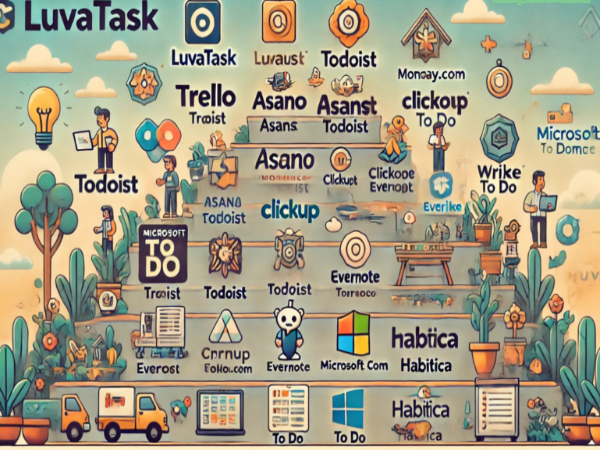Apps Like Luvatask: Top Task Management Alternatives to Boost Your Productivity
Discover the Best Task Management Tools That Rival Luvatask’s Features and Usability

If you’re searching for apps like Luvatask, you’re likely aiming to find a powerful, intuitive, and efficient task management solution. Luvatask is known for its gamified approach, user-friendly interface, and effective collaboration tools—but it’s not the only player in the game. Whether you need an app for personal organization, team-based projects, or complex workflow management, there are numerous alternatives that offer similar or even better features tailored to different productivity needs. This comprehensive guide will help you explore the best apps like Luvatask and choose the right one for your goals.
Why Look for Apps Like Luvatask?
Luvatask has made a name for itself with its unique gamification features and streamlined collaboration tools. But every individual or team has specific requirements that may or may not be met by a single app. You might be looking for more advanced project tracking, better integration options, offline capabilities, or simply a different user experience. The good news? There are several top-rated apps designed to match or exceed what Luvatask offers.
What to Look For in a Task Management App
Before diving into the list, it’s essential to understand the core features that make a task management app effective:
User Interface & Experience: Easy navigation and minimal clutter
Collaboration Tools: Real-time sharing, task assignments, and team chat
Customization: Custom workflows, labels, tags, and templates
Reminders & Scheduling: Recurring tasks, due dates, calendar integration
Cross-Platform Availability: Web, desktop, and mobile apps
Integration Options: Compatibility with tools like Slack, Google Calendar, Notion, and others
Now, let’s explore the top alternatives to Luvatask.
Todoist
Overview: Todoist is one of the most widely used task management apps, known for its sleek design and cross-platform usability.
Pros:
- Clean and minimalistic interface
- Powerful natural language input (e.g., “Meeting on Friday at 3 PM”)
- Task delegation and project sharing
- Supports labels, filters, and priorities
Cons:
- Some advanced features locked behind a paywall
- Limited real-time collaboration features compared to others
Trello
Overview: Trello utilizes a visual board and card system based on the Kanban method, making it perfect for teams who prefer a more graphical approach to task management.
Pros:
- Highly visual and intuitive
- Great for project overviews
- Extensive Power-Ups (integrations)
- Drag-and-drop functionality
Cons:
- Can get cluttered with too many cards
- May lack depth for highly complex workflows
Asana
Overview: Asana is ideal for teams needing advanced project management with strong collaboration tools and workflow automation.
Pros:
- Robust project and task management tools
- Timelines, dashboards, and workload views
- Automations for repetitive tasks
- Strong team communication features
Cons:
- Steeper learning curve
- Higher pricing for premium features
ClickUp
Overview: ClickUp is an all-in-one productivity platform that combines task management, docs, goals, time tracking, and more.
Pros:
- Highly customizable workflows
- Integrates with hundreds of apps
- Includes docs, chat, and goal tracking
- Suitable for all business sizes
Cons:
- Can feel overwhelming due to feature overload
- Occasional performance slowdowns
Notion
Overview: Notion blends note-taking, databases, and task management into a flexible all-in-one workspace.
Pros:
- Customizable pages and templates
- Ideal for personal productivity and team collaboration
- Database and table functionality
- Seamless integration with task lists
Cons:
- May require time to set up effectively
- Offline access still limited
Monday.com
Overview: Monday.com is a highly visual project management tool that helps teams plan, execute, and track tasks from a single dashboard.
Pros:
- Drag-and-drop interface
- Custom workflows and automation
- Rich dashboard analytics
- Great for enterprise and large teams
Cons:
- Pricing can be high for small teams
- Interface can be busy for beginners
Microsoft To Do
Overview: Microsoft To Do offers a clean, simple task management experience, integrated well within the Microsoft ecosystem.
Pros:
- Seamless integration with Outlook and Microsoft 365
- Smart daily planning with “My Day” feature
- Simple and clean interface
- Great for individual productivity
Cons:
- Not ideal for complex team projects
- Limited advanced features
TickTick
Overview: TickTick is a feature-rich to-do list app that supports everything from habit tracking to Pomodoro timers.
Pros:
- Built-in Pomodoro timer and calendar view
- Habit tracking
- Recurring tasks and smart lists
- Cross-platform support
Cons:
- Interface might feel cluttered
- Free version has limitations
Things 3 (iOS/macOS only)
Overview: Things 3 is a beautifully designed app for Apple users looking for elegance and simplicity.
Pros:
- Award-winning design and UX
- Calendar and reminders integration
- Focused daily planning
- Native macOS and iOS experience
Cons:
- No Windows or Android support
- One-time purchase can be expensive
Quire
Overview: Quire is a lesser-known but powerful app that supports nested task structures for better project visualization.
Pros:
- Sub-task tree structure for breaking down tasks
- Clean and modern UI
- Real-time collaboration and file sharing
- Free plan with generous limits
Cons:
- Lacks third-party integrations
- Not as widely adopted as others
Final Thoughts: Choosing the Right App for Your Needs
Finding the right task management tool is about matching your workflow preferences with the features offered by the app. If you love gamification, apps like Luvatask, TickTick, or Habitica may appeal to you. For visual planners, Trello or Monday.com are excellent. Power users needing automation and customization might gravitate toward ClickUp or Asana.
Remember, the best productivity app is the one that aligns with how you think and work. Try a few of these alternatives, explore their free trials or plans, and see which one feels the most intuitive and effective for your day-to-day life.



